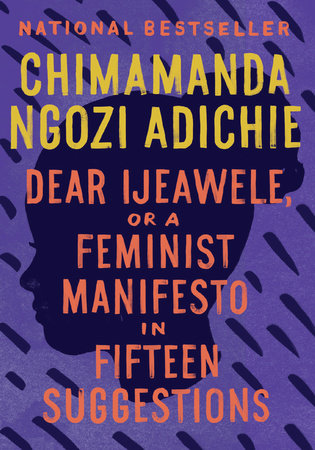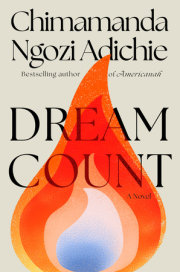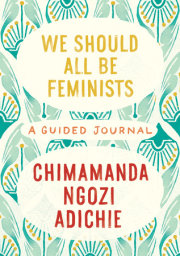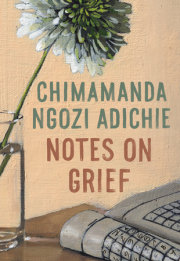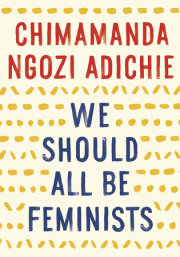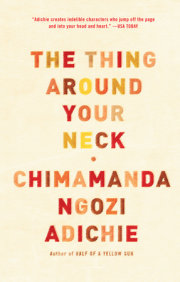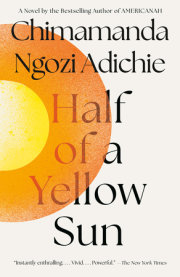Introduction
When a couple of years ago a friend of mine from childhood, who’d grown into a brilliant, strong, kind woman, asked me to tell her how to raise her baby girl a feminist, my first thought was that I did not know. It felt like too huge a task. But I had spoken publicly about feminism and perhaps that made her feel I was an expert on the subject. I had over the years also helped care for many babies of loved ones; I had worked as a babysitter and helped raise my nephews and nieces. I had done a lot of watching and listening, and I had done even more thinking.
In response to my friend’s request, I decided to write her a letter, which I hoped would be honest and practical, while also serving as a map of sorts for my own feminist thinking. This book is a version of that letter, with some details changed.
Now that I, too, am the mother of a delightful baby girl, I realize how easy it is to dispense advice about raising a child when you are not facing the enormously complex reality of it yourself.
Still, I think it is morally urgent to have honest conversations about raising children differently, about trying to create a fairer world for women and men.
My friend sent me a reply saying she would “try” to follow my suggestions.
And in rereading these as a mother, I, too, am determined to try.
****
Dear Ijeawele,
What joy. And what lovely names: Chizalum Adaora. She is so beautiful. Only a week old and she already looks curious about the world. What a magnificent thing you have done, bringing a human being into the world. “Congratulations” feels too slight.
Your note made me cry. You know how I get foolishly emotional sometimes. Please know that I take your charge—how to raise her feminist— very seriously. And I understand what you mean by not always knowing what the feminist response to situations should be. For me, feminism is always contextual. I don’t have a set-in-stone rule; the closest I have to a formula are my two “Feminist Tools” and I want to share them with you as a starting point.
The first is your premise, the solid unbending belief that you start off with. What is your premise? Your feminist premise should be: I matter. I matter equally. Not “if only.” Not “as long as.” I matter equally. Full stop.
The second tool is a question: Can you reverse X and get the same results?
For example: Many people believe that a woman’s feminist response to a husband’s infidelity should be to leave. But I think staying can also be a feminist choice, depending on the context. If Chudi sleeps with another woman and you forgive him, would the same be true if you slept with another man? If the answer is yes, then your choosing to forgive him can be a feminist choice because it is not shaped by a gender inequality. Sadly, the reality in most marriages is that the answer to that question would often be no, and the reason would be gender-based—that absurd idea of “men will be men,” which means having a much lower standard for men.
I have some suggestions for how to raise Chizalum. But remember that you might do all the things I suggest, and she will still turn out to be different from what you hoped, because sometimes life just does its thing. What matters is that you try. And always trust your instincts above all else, because you will be guided by your love for your child. Here are my suggestions:
first suggestion
Be a full person. Motherhood is a glorious gift, - but do not define yourself solely by motherhood. Be a full person. Your child will benefit from that. The pioneering American journalist Marlene Sanders, who was the first woman to report from Vietnam during the war (and who was the mother of a son), once gave this piece of advice to a younger journalist: “Never apologize for working. You love what you do, and loving what you do is a great gift to give your child.”
I find this to be so wise and moving. You don’t even have to love your job; you can merely love what your job does for you—the confidence and self-fulfillment that come with doing and earning.
It doesn’t surprise me that your sister-in-law says you should be a “traditional” mother and stay home, that Chudi can afford not to have a double-income family.
People will selectively use “tradition” to justify anything. Tell her that a double-income family is actually the true Igbo tradition because not only did mothers farm and trade before British colonialism, trading was exclusively done by women in some parts of Igboland. She would know this if reading books were not such an alien enterprise to her. Okay, that snark was to cheer you up. I know you are annoyed— and you should be—but it is really best to ignore her. Everybody will have an opinion about what you should do, but what matters is what you want for yourself, and not what others want you to want. Please reject the idea that motherhood and work are mutually exclusive.
Our mothers worked full-time while we were growing up, and we turned out well—at least you did; the jury is still out on me.
In these coming weeks of early motherhood, be kind to yourself. Ask for help. Expect to be helped. There is no such thing as a Superwoman. Parenting is about practice—and love. (I do wish, though, that “parent” had not been turned into a verb, which I think is the root of the global middle-class phenomenon of “parenting” as one endless, anxious journey of guilt.)
Give yourself room to fail. A new mother does not necessarily know how to calm a crying baby. Don’t assume that you should know everything. Read books, look things up on the Internet, ask older parents, or just use trial and error. But above all, let your focus be on remaining a full person. Take time for yourself. Nurture your own needs.
Please do not think of it as “doing it all.” Our culture celebrates the idea of women who are able to “do it all” but does not question the premise of that praise. I have no interest in the debate about women “doing it all” because it is a debate that assumes that caregiving and domestic work are singularly female domains, an idea that I strongly reject. Domestic work and caregiving should be gender-neutral, and we should be asking not whether a woman can “do it all” but how best to support parents in their dual duties at work and at home.
Copyright © 2018 by Chimamanda Ngozi Adichie. All rights reserved. No part of this excerpt may be reproduced or reprinted without permission in writing from the publisher.





